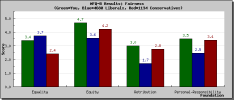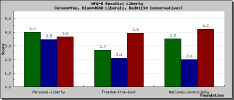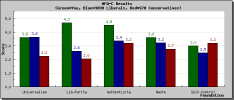Laura said:Taking all this together suggests that the 6 foundation moral system is a consequence of this spiritual influence on humanity, that the evolution of GROUPS isn't so much evolution as an expression of spiritual connections at higher levels. The conflict within the individual isn't so much the conflict of double-mindedness due to evolution on the two tracks, but rather the conflict of the soul vs. the animal based body system.
I had similar thoughts while reading Haidt (it's become a habit whenever reading materialist evolutionary accounts!). I'd just add that in a sense, it's both evolution AND spiritual connection. In other words, I don't see anything wrong with Haidt's main story: selfishness was adaptive for the individual in the group, but groupishness helped certain groups outcompete those who couldn't bind together. The roadblock for Darwinists is where those new traits come from - what their true nature is. They just write them off as random mutations. But as Laura wrote above, it's actually the establishing of a connection to higher spiritual levels. At a certain evolutionary level, beings can access more possibilities, and then manifest them.
Basically, having a good spiritual connection is evolutionarily adaptive for groups in the face of competition and attack both from individuals and other groups. Life has to have a very strong base of self-preservation in order to keep the species going so that it can reach higher levels. So STS is absolutely necessary for 2D and 3D. (There's a reason Ra said the requirement for STO graduation is only 51% STO, I think! Humans wouldn't survive long enough to polarize in that direction without a relatively healthy sense of self-preservation - food, shelter, reproduction...) And even groupishness needs to have a protective instinct, so that groups don't get wiped out. But like everything, it can get messy: free riders going unnoticed, extreme ethnic inclusivity/exclusivity, world wars, etc.
Anyway, these are some of the thoughts I've had about this and why I suggested that the 3 foundation moral system of the Liberal left in the US is that of the Organic Portal, while the 6 foundation moral system of the right is more like the STO position which considers others - within a group - as self, so to say.
Obviously, as humans, we don't always get things right when they are stepped down from higher densities, but the group care, loyalty, submitting to the authority of the "group mind", and care for sanctity - higher principles - seem to be reflections of higher density STO influences. Yes, care for the individual is there, but is not the primary focus because, as the Cs say, its not the body but the soul that counts and to be body-centric is to be STS. That seems to describe the left/liberals pretty well.
I'm still trying to work this through in my mind to see if it holds. There's a bunch of data to take into account. E.g., check out the chart that Neil posted when he took the test: https://cassiopaea.org/forum/index.php/topic,45426.msg749091.html#msg749091 Liberals do have SOME of those other moral foundations, they're just not as strong as Care and Fairness. I'd be interested in seeing a breakdown of the extremes. Are there any outliers who don't value Loyalty, Authority and Purity at all? Maybe those would be the pure OP types? Or maybe those stats just reflect liberals "reflecting" a deeper morality, but in a caricatured version (e.g., the "organic food" purity in contrast to purity about sex).
Also there's the personality research to take into account (liberals being higher on openness to experience, conservatives being low on that and higher on conscientiousness, similar to the differences between women and men). As Haidt describes near the end, someone high on openness will probably find themselves in a liberal environment and then drink the koolaid to conform to their new group. Open types are also the ones to search out new ideas. Conservatives tend to stick to old ideas, even when they're stale and out of date. I think new revelations probably need open individuals to receive them.
It's almost as if the stereotypical liberal morality is an archetype of the OP mentality. It's not necessarily that any individual liberal with those beliefs will conform exactly to type - just a tendency to go in that direction. And conservative morality represents the souled mentality. But some conservatives may find themselves conservatives just because of their lack of openness, and conform to the group moral foundations out of groupishness, just putting on the display of morality in order to survive in the group, like Haidt describes humans doing. Dunno!



